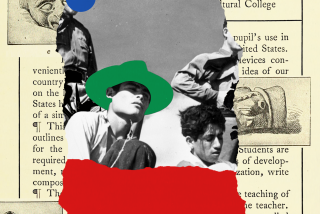U.S. Has Not Been All Pure in Philippines, but Still Has Cause for Pride
- Share via
From 1964 to 1974 thousands of GIs passed through Clark Field in the Philippines en route to South Vietnam. How many of them deplaned to stretch their legs and thought, as I did, how incongruous the Stars and Stripes looked there, waving against a background of Asian scrub and jungle? Yet this was truly American soil, hallowed by our blood in 1898 and 1941-45. Here we had been both conquerors and liberators, arguing, as the French revolutionaries had, that in an imperialistic world democratic republics must be prepared to spread their ideals by force.
Now the Filipino people, in the best tradition of democratic republics, have spontaneously risen up to expel a tyrant in their midst. And, far from being incited to violence by frenzied ayatollahs or duped by communist insurgents promising “reforms,” the Filipinos gave us the romantic spectacle of ordinary citizens forming human ramparts to guard ballot boxes with their bodies. It was as if the sappiest U.S. propaganda films of the 1950s--democracy in action--had come to pass. We’re so proud of them today; can we be proud of ourselves as well?
True, we seized the Philippines in war, crushed its independence movement and made the islands our outpost in East Asia. But it’s also true that 1898 was the apex of global colonialism, and if we had merely expelled the Spaniards and then gone home, the islands would have fallen into the clutches of the Germans, or the British, or the Japanese.
It’s also true that the Progressive Era of U.S. governments talked of preparing the islands for independence almost at once. Civil government was installed as early as 1901, and the Jones Act of 1916 endorsed independence. By 1925 only one American, the education secretary, was left in the Filipino cabinet. And, thanks to the U.S. government, the Filipino people, with their 70 different dialects, became literate and versed in a common language. Commonwealth status followed in 1935, and independence in 1946 as soon as the Japanese invaders were expelled. Under American tutelage the Filipinos learned the ropes of democracy, party politics and free enterprise as they existed in the United States--that is, not excluding their excesses and corruption, but also not excluding the capacity for popular outrage at such excesses. That is what we witnessed this week.
Or is it too early to cheer, much less to take credit? Might the Philippines now slide into anarchy as Ferdinand E. Marcos warned, expel our military bases, even become communist? Perhaps, but consider that virtually all of the Marxist regimes in the Third World are heirs of the French, Spanish, Italian and Portuguese empires. Ex-British and ex-American colonies show little tolerance for totalitarianism.
Now, comparing Third World countries of vastly different cultures is simplistic, but it does appear that two key discouragements to Marxism are an Anglo-American heritage and a strong Roman Catholic Church. The Philippines have both.
Since independence, the islands have ridden a teeter-totter. The second Filipino president came to office through a fraudulent election, giving impetus to the communist-led Hukbalahap rebellion. His successor, an honest and energetic statesman, Ramon Magsaysay, emerged to suppress the Huks and restore democracy, only to be killed in a plane crash in 1957. Corruption gradually renewed its grip until 1965, when Ferdinand E. Marcos won election on a reform platform. Then he, too, succumbed to the temptations of power. Meanwhile, the United States looked on tolerantly, lest it be accused of still trying to “run” its former colony.
Now, in 1986, the opportunity and the will seem to have found each other, and the Reagan Administration has “managed” a transition from tyranny to democracy in one of America’s client states.
What better metaphor for U.S. policy than the stormy boat trip of George C. Marshall, who was destined to be the chief of staff in World War II, when he first arrived in the Philippines in 1902: “I am not exaggerating when I say that the boat would tilt over until the longboats on the upper deck would go into the water . . . . The captain was frightened--or sick. The Filipino at the wheel got his ribs smashed, and he was gone. That left nobody to steer and nobody to command. So a young fellow, Lieutenant Daly, and I took over the boat. The two of us got the wheel and, of course, turned it in the wrong direction. We were heading towards a forbidding-looking mountain before we got it straightened out and turned the other way.”
The Philippines, with Americans helping at the wheel, have finally turned the other way. Does this mean that even American conservatives have finally been “converted” to human rights, and are no longer willing to tolerate dictators just because they are anti-communist? Anthony Lewis in the New York Times thinks so, and boasts that even Jeane Kirkpatrick changed her tune and deserted Marcos. In fact, events in the Philippines only confirm the thesis that first brought Kirkpatrick to attention. Authoritarian regimes, though corrupt and brutal, are susceptible to reform through opposition press, parties, churches--and popular outrage. Totalitarian ones are not.
More to Read
Sign up for Essential California
The most important California stories and recommendations in your inbox every morning.
You may occasionally receive promotional content from the Los Angeles Times.













